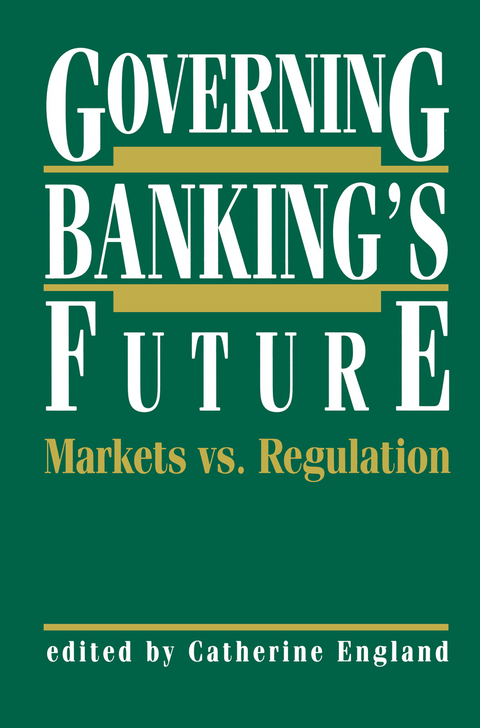
Governing Banking’s Future: Markets vs. Regulation
Springer (Verlag)
978-94-010-5721-9 (ISBN)
Risk-based capital standards presume a need for common capital standards across countries. The details of forging an agreement were left to the staffs of the primary bank regulators in each country, and compromises were inevitable. Although domestic constituencies' reactions to the proposals were invited, the arduous negotiations that led to the proposals generated intense pressure on the principals not to make changes. The European Community's approach to financial integration seems to be driven by a political desire to achieve an integrated market within Europe, despite significant institution al differences among countries. Underlying that desire is a belief that the market pressures that result from different regulatory systems operating in the same market will produce the right answer . The financial provisions of the U .S.-Canada free-trade agreement take a direction that, in my judgment, is more productive. The provisions are more limited in scope than are those of the European initiative. National treatment and national sovereignty are preserved. However, the delicate issue of national responsibility for failing institutions, and its relationship to monetary policies, is not addressed. A Better Alternative A productive basis for international regulation can be formulated around three principles: 1. free entry for foreign-owned subsidiaries chartered under the laws of the host country; 2. national treatment for those subsidiaries; and 3. national responsibility for (a) monetary policy, (b) prevention of unwarranted financial panics in domestically chartered institutions, whether foreign or domestically owned, and (c) supervision of all domestically chartered institutions, regardless of ownership.
I Overview.- 1 Introduction: The Uncertain Future of U.S. Banking.- 2 Governing Banking’s Future: A View from the Fed.- II International Coordination of Regulation.- 3 International Regulation: How Much Cooperation Is Needed?.- 4 Tension between Competition and Coordination in International Financial Regulation.- Comment on International Coordination of Regulation.- III Bank Insulation.- 5 Can Banks Be Insulated from Nonbank Affiliates?.- 6 Banks Are Not Special: The Federal Safety Net and Banking Powers.- Comment on Insulating Banks.- Comment on Bank Insulation.- IV Payment System Risk.- 7 Daylight Overdrafts: Who Really Bears the Risk?.- 8 Payment System Risk: A Private-Sector View.- 9 The Government’s Role in Payment Systems: Lessons from the Canadian Experience.- Comment on Payment System Risk.- 10 A Proposal to Rely on Market Interest Rates on Intraday Funds to Reduce.
| Reihe/Serie | Innovations in Financial Markets and Institutions ; 5 |
|---|---|
| Zusatzinfo | VII, 202 p. |
| Verlagsort | Dordrecht |
| Sprache | englisch |
| Maße | 155 x 235 mm |
| Themenwelt | Wirtschaft ► Betriebswirtschaft / Management ► Finanzierung |
| Betriebswirtschaft / Management ► Spezielle Betriebswirtschaftslehre ► Bankbetriebslehre | |
| Wirtschaft ► Volkswirtschaftslehre ► Finanzwissenschaft | |
| Wirtschaft ► Volkswirtschaftslehre ► Makroökonomie | |
| ISBN-10 | 94-010-5721-4 / 9401057214 |
| ISBN-13 | 978-94-010-5721-9 / 9789401057219 |
| Zustand | Neuware |
| Haben Sie eine Frage zum Produkt? |
aus dem Bereich


